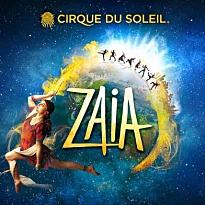 Underscoring the notion that visitors to Macau really only come to gamble, the 10-year deal between Las Vegas Sands’ Macau operations and Quebecois artsy gymnasts/tightrope-walkers/pole-dancers Cirque du Soleil has ended after just three and a half years. Launched with great fanfare in August 2008, Cirque du Soleil’s Zaia production was reportedly filling a mere 40% of available seats at the Venetian Macau last month. In November, Sands China CEO Ed Tracy denied Zaia was on thin ice, telling the Macau Daily Times that the company was “prepared to take a loss to provide that kind of entertainment.” The combined cost of the Zaia production and the custom-built theater it called home has been estimated at $150m. It turned out to be the sole sector of Sands China’s operations that couldn’t turn a profit. As Ron Reese, LVS VP of communications, told Bloomberg: “Entertainment programming is an inexact science.” (Unlike, say, accounting.) Zaia’s last performance is scheduled for Feb. 19.
Underscoring the notion that visitors to Macau really only come to gamble, the 10-year deal between Las Vegas Sands’ Macau operations and Quebecois artsy gymnasts/tightrope-walkers/pole-dancers Cirque du Soleil has ended after just three and a half years. Launched with great fanfare in August 2008, Cirque du Soleil’s Zaia production was reportedly filling a mere 40% of available seats at the Venetian Macau last month. In November, Sands China CEO Ed Tracy denied Zaia was on thin ice, telling the Macau Daily Times that the company was “prepared to take a loss to provide that kind of entertainment.” The combined cost of the Zaia production and the custom-built theater it called home has been estimated at $150m. It turned out to be the sole sector of Sands China’s operations that couldn’t turn a profit. As Ron Reese, LVS VP of communications, told Bloomberg: “Entertainment programming is an inexact science.” (Unlike, say, accounting.) Zaia’s last performance is scheduled for Feb. 19.
Cirque du Soleil continues to be popular in Las Vegas, where Strip casinos derive over 60% of revenue from non-gaming sources. Compare that to Macau, where non-gaming revenues account for a mere 11% of the total haul. Even Singapore, which (a) demanded that the developers of the city-state’s two integrated resorts (IR) devote less than 15k square meters to actual casino space, (b) restricted junket operations and (c) threatened to fine IR operators if their non-gaming revenues didn’t reach 50% of the total, can’t seem to tip the scales. Figures from Marina Bay Sands last quarterly report showed just 24.4% of total revenues coming from non-gaming sources, while Resorts World Sentosa’s non-gaming revenues were only 16.3%.
Much of Macau’s problem can be explained from visitor stats published by the local authorities. While the average Vegas visitor spent 3.6 nights on the town in 2010, his or her Macau counterpart was on the scene less than half that time (1.5 nights) during the first 11 months of 2011. In other words, Macau visitors are there with a purpose. Get in, get lucky (at the tables), get out. It’s almost as if anything not resembling a baccarat table is viewed as an obstacle.
But Melco Crown Entertainment is bucking this trend by drawing actual crowds to its House of Dancing Water show, which opened in September 2010 at the City of Dreams. The Wall Street Journal reported that the company is even considering adding extra shows due to the “enthusiastic support” audiences have demonstrated. Melco Crown co-COO Nicholas Naples told Macau Business that “non-gaming attractions create the premium envelope for the gaming activities to fit into. This is the real differentiator between casino resorts since most of the games within the casinos are similar.” This desire to differentiate convinced Galaxy Entertainment to launch a multi-screen cinema in December. Offering Chinese film fans a chance to see international fare that doesn’t make it to theaters on the mainland hasn’t exactly set Galaxy’s books afire, but then again, getting the cinema up and running cost a hell of a lot less than $150m.
So why has House of Dancing Water succeeded where Zaia failed? Hell if we know. Study the trailers for each below and draw your own conclusion.





